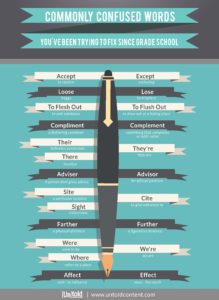Trainings >> 10 Commonly Confused Words
10 Commonly Confused Words
By: Alicia Surrao & Georgia Turpin
The old saying goes that you shouldn’t judge a book by its cover. But when it comes to grammar, we are under near-constant scrutiny in our professional lives. Our likelihood of getting promoted and making more moulah is directly (and negatively) impacted by misspellings and grammar mistakes.
The way we write—and the time we take to learn how to write correctly—says something about our intelligence and attention to detail. A person that makes simple grammar or spelling mistakes may be perceived as being careless or lazy. It’s a vulnerability that isn’t as problematic for a person who writes well and consistently nails their grammar fundamentals.
This blog won’t teach you all there is to know about writing well. If you’re ready to take that leap, check out our comprehensive online writing course, Wordsmith: A Grammar & Style Refresher for Busy Professionals. Today, we’re going to walk through ten commonly confused words you’ve been trying to fix since grade school. Because, baby steps.
And to ensure that you recall these long after you close the browser, we’ve made an infographic to help you remember today’s most commonly confused words and idioms. So, print out the infographic above, hang it in your cubicle, stick it on your refrigerator, tattoo it on the back of your hand—whatever it takes—to avoid these embarrassing grammar mistakes and misspellings once and for all. And if you’re ready to take it to the next level, download the Untold Guide to Avoiding the Most Common Grammar Mistakes!
Here we go…
- Accept vs. Except
Although they’re phonetically very similar, accept is a verb meaning to receive, while except is used as a preposition or conjunction to indicate exclusion. Just remember, accept is always used as a verb (accept is an action).
The bank accepted my loan application.
The interview went well, except that I sweated the whole time.
- Loose vs. Lose
Although the two words are quite different, we can blame this common mix-up on imprecise spelling. The word loose is an adjective meaning baggy, while the verb to lose means to fail or to misplace. Here’s a fun tip to remember: Loose is spelled with an extra o, so lose the extra o to get lose!
I will not lose this competition.
My tooth is loose. I should really go to the dentist.
- To Flesh Out vs. To Flush Out
The expression to flesh out means to add substance. When writing a paper, for example, you may start with an outline, and then flesh out the body of the text later. The word flesh means meat, or the muscular parts of a body. Anatomically, a body starts with a skeleton, and is then fleshed out with muscles, tissues, and so on.
A common mistake is to use the expression to flush out when adding detail. To flush out, in fact, means to clear out or drive out.
Clara is meeting Bryce to flesh out an agenda for their upcoming meeting.
The dogs flush out the birds from the field each morning.
- Compliment vs. Complement
A compliment, with an i, is a flattering comment or praise. To complement, spelled with an e, is to complete, match, or add value. Homophones are tough, but especially in this case where the words hold similar, positive meanings. Here are some examples:
I give generous compliments. (Say this one out loud, while emphasizing the I. It will help you remember that compliment is spelled with an i.)
My boss complimented me on my presentation design.
The presentation design complements the content. It really brings the message to life!
- Their vs. They’re vs. There
Okay, listen up, because this one is essential. Their indicates possession, they’re is a contraction meaning they are, and there is a location.
If you mix these three words up, people will look at you with their judgy eyes. (Possessive adjective)
They’re right. You should probably know the difference by now. (Contraction of they are)
There is no reason you should mix these three up from here on. (Notice the “here” in there. It’s a position/location word!)
- Adviser vs. Advisor
This one is less obvious, and probably holds less ground for judgment. But the word adviser is typically used as a general term to refer to a person that gives advice. The more formal word advisor refers to someone who holds an official position for advice-giving.
My brother-in-law is my adviser on all things outdoors!
My PhD advisor guides my research and assesses my progress.
- Site vs. Sight vs. Cite
These dreaded homonyms! The word site indicates a particular location (and can be short for the word website). Sight refers to vision. Finally, cite comes from the word citation and means to give reference.
There are three park sites that can be found within a 25-mile range of her house.
The Changing of the Guard was an emotional sight to see.
In the bibliography, the researchers cites their references.
- Farther vs. Further
Okay, these two are easy to confuse, so no judgement. But luckily, there’s an easy way to keep them straight. Farther refers to a physical distance, while further refers to a figurative distance. Here’s a trick: let the word far in farther remind you that you are talking about a true geographical distance.
The gas station is farther than expected.
Investigators dove further into the case.
- Were vs. We’re vs. Where
Another key set of words to distinguish in your brain: were, we’re, and where. Were means used to be, we’re is the contraction of we are, and where refers to a physical or metaphorical location.
They were preparing for the meeting. or Were you looking for the remote earlier? (Plural past and second person singular past of to be)
We’re going to the park. (Contraction of we are)
Where is the park located? (Indicates a location; hint: here in the word where should remind you that you’re talking about a location.)
- Affect vs. Effect
This one is a classic. To affect something means to impact or influence it in some way. An effect is a result. Just remember, affect starts with an a and it means action.
She was astonished at the effect reading had on young children. (noun; result)
Homeowners were affected by the housing crash in 2008. (verb; impacted)
Loving this grammar advice on commonly confused words? Download our full infographic, featuring 3 full pages of grammar wisdom you can use for quick visual reference!



